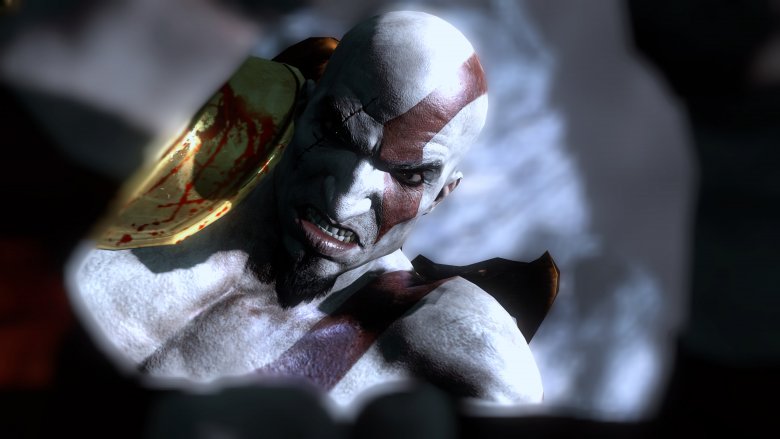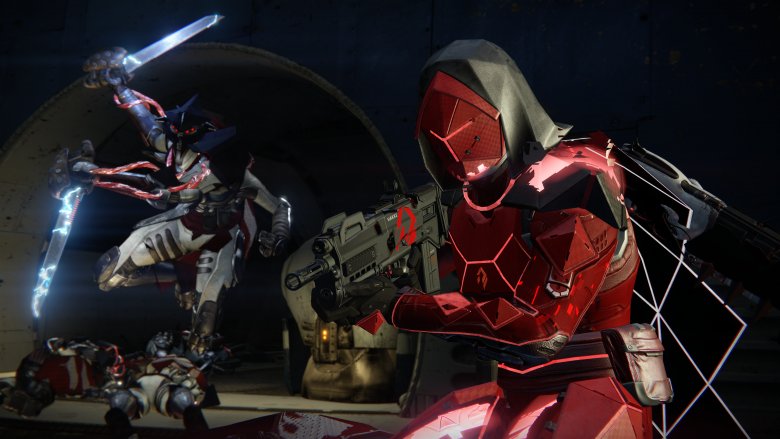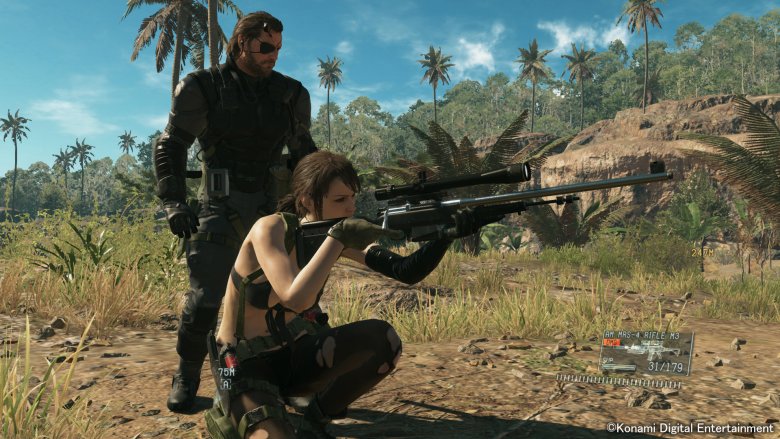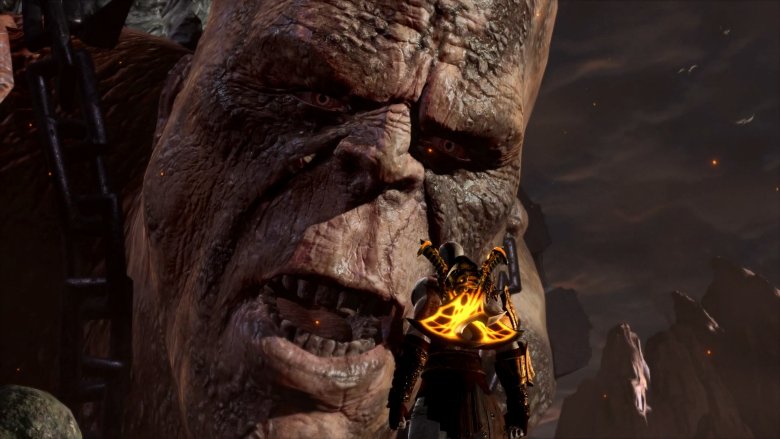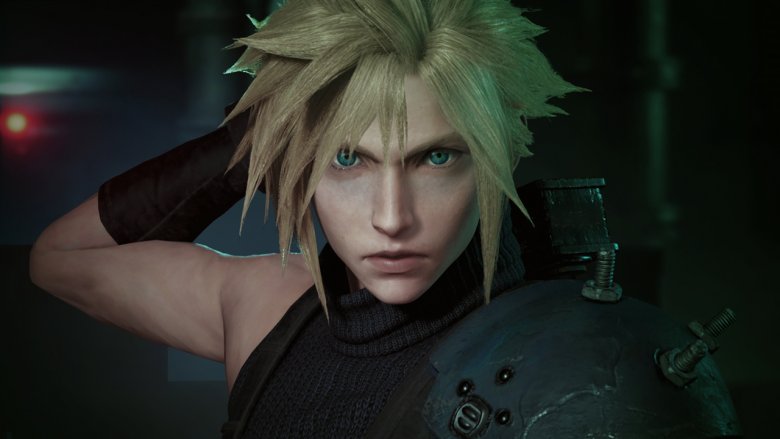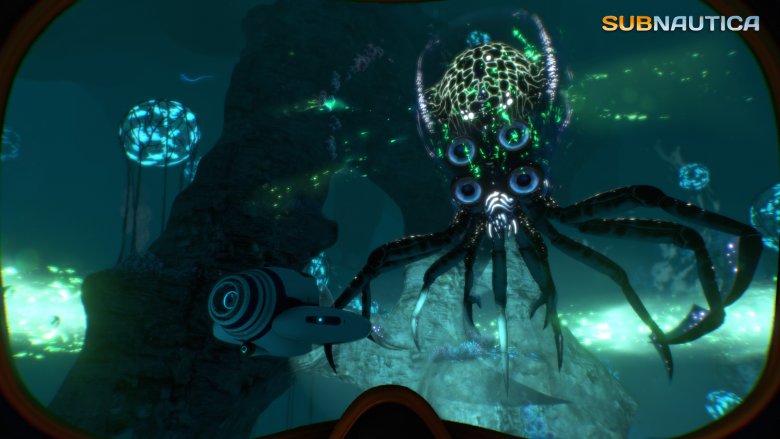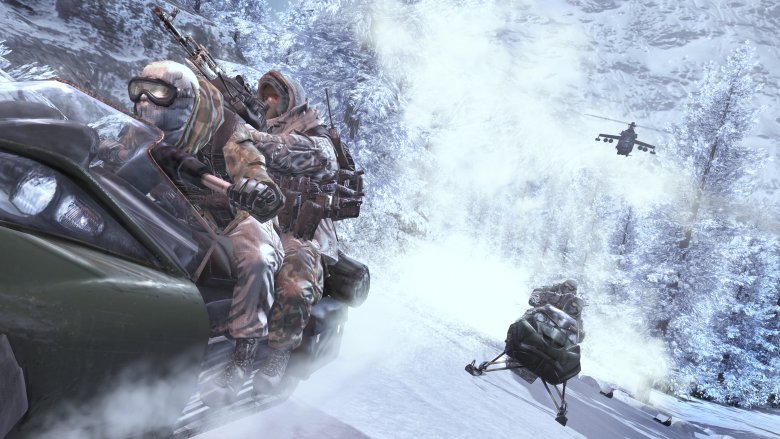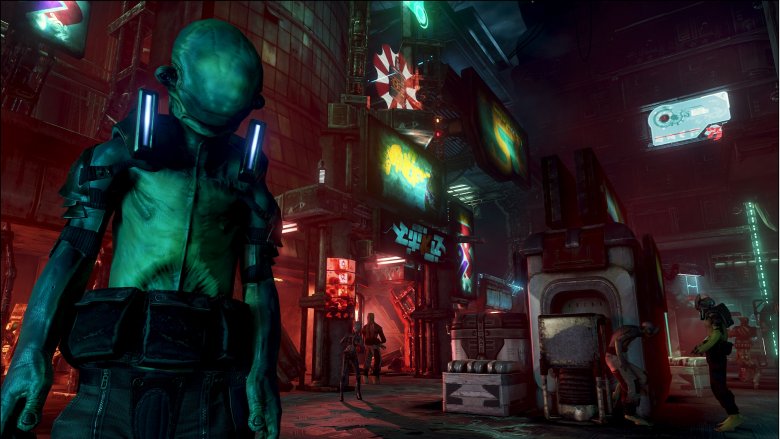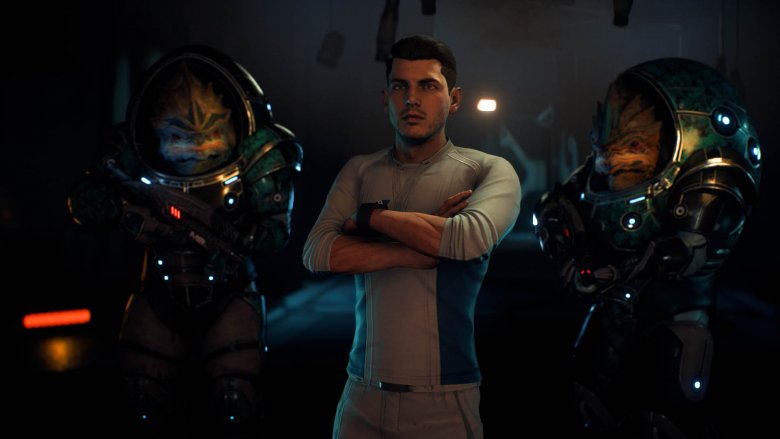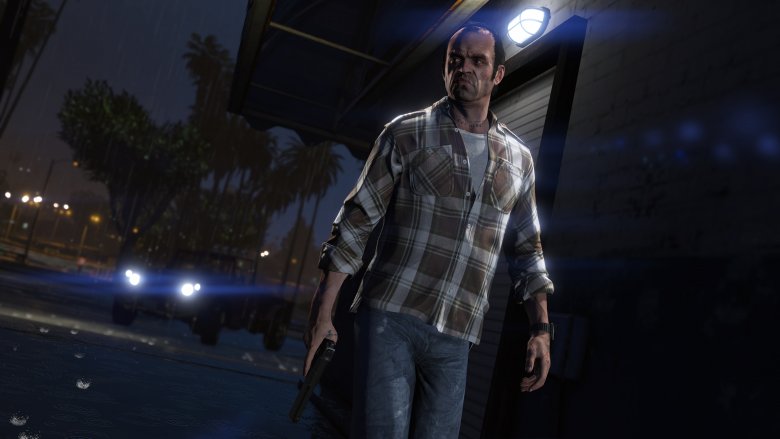Mistakes That Got These Game Developers Fired
Nobody ever said making a video game would be easy. The director has to wrangle a team of wildly divergent personalities, interests, and ambitions; meanwhile, the various developers have to balance their own personal talents and dreams with the needs of the studio as a whole. With finicky game engines, corporate oversight, and the ever-fickle gaming audience thrown into the mix, it's really a miracle that any game ever gets made — let alone released to stores — at all.
Through all that creative chaos, mistakes are going to happen — and sometimes they can cause some serious lasting damage to the game's development, or the studio's reputation. And then there are the big bombs, the jaw dropping screw-ups that somebody, somewhere, is going to have to pay for. We shouldn't want to know about these train wrecks ... and yet of course we do. Here are nine mistakes that got game developers fired.
Marty O'Donnell became too much – and too little – for Bungie to handle
That soaring soundtrack as we load up the title screen of the very first Halo. It was the moment the entire industry realized that Microsoft hadn't just entered the console market: they were about to revolutionize it. Bungie's shooter masterpiece defined the genre, the Xbox, and the entire industry for another decade, and composer Marty O'Donnell's incredible music was a major factor in the franchise's success, a symphonic magnum opus that was equally at home in car stereos as on TVs.
But somewhere during the development of Bungie's next franchise, Destiny, everything went horribly wrong. As Kotaku reports, Activision's management determined that O'Donnell's score simply wouldn't work for a trailer, and had it replaced for the E3 demonstration. O'Donnell raged against this affront to his work, which in turn frustrated Bungie management. Tensions soared, morale dropped, and O'Donnell stopped putting in as much work effort as he was supposed to. As a result, he was fired.
It seems like a clear case of an artist's investment in his own work; when his work was denigrated (at least in his own mind), he stopped working. Whether Bungie's termination of one of their most revered employees was justified — and the court ruled it was not — O'Donnell might have held onto his job had he managed the situation better.
Konami didn't see the value in Hideo Kojima
He's only one of the most famous names in video games. Hideo Kojima, whose decades-long work on his own Metal Gear Solid franchise has made him a legend, is one of the most interesting, original, and thought-provoking minds in the entire industry. There's just no one else who can blend Western military-espionage fiction, Japanese anime influences, and highbrow philosophical concepts into a game that just soars. He is singular. Unique.
So Konami fired him.
While the specific details behind Kojima's termination from the publisher remain unknown, it seems he and Konami had strong disagreements over scheduling, budget, and creative direction. Basically, Kojima wanted to take a long time, and spend a lot of money, to get Metal Gear Solid V: The Phantom Pain just right. Konami wanted it faster and cheaper, and they were fed up arguing with an artist. Kojima was shown the door, and Konami felt they now had things under control.
Big mistake. The next Metal Gear game, subtitled Survive, was a complete bomb. Perhaps people actually, you know, care about quality? Imagine! And quality doesn't come fast or cheap. It comes with Kojima.
Stig Asmussen couldn't replicate God of War III's success
Action games don't get much bigger than the God of War series. Built on mythical scale and epic storylines, God of War is all about pushing technology and combat to the limits of possibility. God of War III pulled that trick off marvelously for the PlayStation 3, and it remains a beloved entry in that stellar franchise. Just ask its PS4 remaster.
Stig Asmussen was the brains behind God of War III, but after completing that title, he wanted to move on to another franchise. Something of his own design, a game he could mold from scratch. Sony, naturally, was in love with the man at the time, and gladly gave him a reported $100 million budget to make a science fiction opus. The world was his to conquer.
Instead, his game was canceled.
Sony has never officially commented on what happened, or even admitted that the game ever existed in the first place. But insiders claim that the game was, simply, garbage. How could Asmussen, who had done so well on God of War, turn around and deliver such an awful product? Perhaps it was unbridled ambition, or perhaps he'd had a great idea for a new gameplay hook that just hadn't worked. And then again, maybe he just screwed up. Asmussen was rewarded for his failure by being pushed out of the company, and a number of his staff were laid off with him.
CyberConnect 2 phoned it in on the biggest gig of their existence
Once upon a time, there was a video game. You may have heard of it. It was called Final Fantasy VII, and it transformed the industry. From its bleeding-edge graphics and cutscenes to its simple yet deep progression systems and its grandiose storytelling, Final Fantasy VII was a key moment in the evolution of a "kids'" medium into serious art. It defined an era. It's still a beloved classic to this day.
So when Square Enix announced that they were making an entirely new game – not a simple remaster, a ground-up remake — fans went ballistic. There are few titles that still garner that much passion 20 years after their original release. So for developer CyberConnect2, who were tapped to actually make the game, it was the opportunity of a lifetime.
They whiffed it.
Citing factors such as a "stable schedule" and "quality" — which are kind of important, really — development lead Naoki Hamaguchi announced that CyberConnect2 was being pulled off of development, and that Square Enix itself would take over production duties. Clearly, CyberConnect2 had been dragging their feet, and not out of perfectionism. You'd think the developer would want to give such a high-profile project their all. They didn't.
A Subnautica dev was fired for being, well, ungentlemanly
In general, just be nice. It's not that hard; in fact, it often involves doing nothing at all. You have to go out of your way to do something mean. But Subnautica's original sound designer, Simon Chylinski, put in the effort to make lots (and lots and lots) of nasty and bigoted comments throughout the internet. One of them was even a reply to a poll posted by game director Charlie Cleveland.
That last bit is probably what did Chylinski in. It looks as though nobody else at developer Unknown Worlds Entertainment was aware of his second life as a troll until he piggybacked off Cleveland's poll. That opened up a community investigation into his behavior, which was eventually enough to push Cleveland into firing Chylinski.
Sure, you could say that the mistake here was drawing his own company's attention to his unsavory behavior; that if he'd just avoided responding to the poll, he'd still have a job. And maybe that's true. But really, the mistake was just being a jerk in the first place. Don't make the mistake he did, kids. Be nice.
The Call of Duty creators didn't read their contracts closely enough
In general, if an employee does some good work and makes you some money, you'll want to reward that employee. You want them to continue doing that work so they continue making you money. Seems obvious, right? Well, two particular Activision employees, Jason West and Vince Zampella, made their bosses a whole truckload of money. See, West and Zampella were the masterminds behind Call of Duty, and the guys that grew it from a brand-new World War II series into the modern-day behemoth it eventually became.
In return, Activision fired them.
This appears to be related to the rights to the franchise itself, which Activision agreed to leave in the duo's hands in a contract they all signed. But that contract had a loophole: if the two were fired, Activision would obtain the rights to Call of Duty by default. Not long afterwards, tensions flared between the company and the creatives, and soon enough, West and Zampella were let go.
While it seems West and Zampella might not be entirely blameless, it's awful to be fired after making the most profitable franchise in the industry. Especially since it seems to have been more a matter of rights negotiation than anything else. If the two had just read their contracts more carefully, the whole situation might have been avoided.
Prey 2's original developers had to fight their own publisher
Prey 2 announced its existence to the world through an awesome trailer that demonstrated style, atmosphere, and and a distinctive edge. It also didn't show any actual gameplay. And it also never arrived (or at least, this Prey 2 didn't) — because the developers went and got themselves fired.
Once again, this came down to a contract dispute. Human Head Studios, the developer, apparently thought they were getting a raw deal from ZeniMax, their publisher. The terms of this deal are not publicly known, and no one has ever gone on record about it. Bethesda claims the game simply wasn't high-quality enough to publish; but IGN spoke to sources who claimed that, instead, Bethesda had promised Human Head more funding and then yanked it at the last second.
Whether Human Head truly was the victim here, or whether they were just trying to get more money out of ZeniMax than they should, the result was that the developer shut down work on the game, effectively going on strike. ZeniMax didn't budge. Eventually, the rights to Prey 2 reverted to the publisher, and Human Head was left with nothing.
Read those contracts closely, guys.
Mass Effect: Andromeda got enough rope to hang itself, and its studio head
Given how it turned out, a lot of people wonder just how a game like Mass Effect: Andromeda could exist. It was supposed to start off a whole new era of BioWare's beloved sci-fi series, bringing the franchise back to life after a five-year hiatus. And yet the final product was a buggy, scattered mess, lacking the engaging characters and politics of the original trilogy. Future work on the IP was later shelved, likely due to low sales and tarnished reputation.
What happened? According to a long report by Kotaku, development on the game started with galaxy-sized ambitions. Literally. BioWare wanted to let the player traverse the entire Andromeda galaxy at will, visiting procedurally-generated planets as they wished. It was a huge undertaking, and as it turned out, an ultimately fruitless one: the game shipped with only a handful of hand-crafted planets to explore.
Lots of games have to scope down their ambitions. The trouble here was that BioWare wasted years chasing this "travel the galaxy" idea, which was time — and money — that could have been spent making a better final product. At the end of the day, this is the kind of call that a studio head has to make: to stop going for the impossible, and focus on the doable. BioWare General Manager Aaryn Flynn apparently took too long to make that decision. He "stepped down" from his post not long after Andromeda's troubled launch, which is almost certainly PR-speak for "fired."
Leslie Benzies wanted as much money as his bosses
Though it started as a couple of simple, top-down shooters, Grand Theft Auto has evolved into a sweeping set of American satires, brimming with living cities, ripping narratives, and impressive realism that blends in elements of the absurd. Rockstar Games can't seem to swing and miss with this series, no matter how controversial they get.
So at some point, the creative director behind the whole franchise, Leslie Benzies, decided he wanted more money. And in a plot worthy of one of his own games, his bosses got angry that he wanted a bigger cut of the spoils, turned on him, and pushed him out. According to Benzies, Rockstar's upper management concocted a scheme to remove him from the studio and then deny him up to $150 million in royalties.
Conversely, Rockstar alleges that Benzies suddenly decided he wanted the same royalties as the company founders, the Houser brothers. In other words, the creative's head had gotten too big for his shoulders, and when he was refused, he sabotaged his own work output. If that's true, it was a gambit that backfired on Benzies horribly: he ended up out of work, with Rockstar hoarding that GTA money all to themselves.

